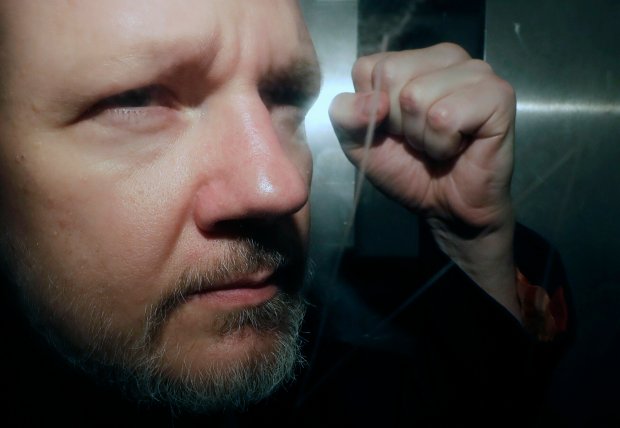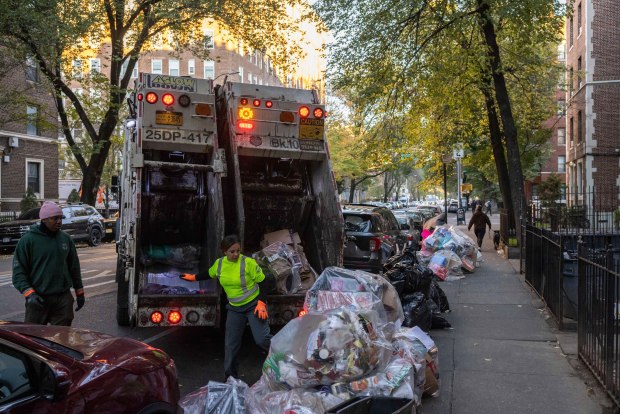The Middle East continued to dominate international news in 2024, but, over the course of the year, the Tribune Editorial Board also turned its attention to pop stars and McFlurry machines. And it cheered the release of a fellow journalist from Vladimir Putin’s clutches.
Here’s a look back at the year in Tribune editorials focused on the world beyond Chicago.
Feb. 4: Republicans go after Taylor Swift. The editorial board does not approve.
We now have the MAGA crowd bad-mouthing Swift, which is about as politically astute an action for a party struggling to appeal to women as finding yourself the target of multiple indictments before an election. If the likes of Sean Hannity drive Swift, and thus Swifties, into the realm of explicit endorsements, robocalls (“Hi, this is Taylor for Joe Biden”) and stump speeches due to their own juvenile obnoxiousness, they hardly will have served their own ends. Heck, she might well take a good chunk of the NFL crowd with her, especially the good people of Missouri and Kansas, red states the both. It’s as asinine as it is un-American. So we were glad to see Nikki Haley and Liz Cheney remove themselves from this rapidly metastasizing narrative.
Feb. 8: GOP hard-liners go squishy in their support for Ukraine. The editorial board begs to differ.
Republicans ought to approve the $60 billion in military assistance for Ukraine, as well as the billions for aid to Israel and humanitarian efforts in the war-torn Gaza Strip that was part of the legislation. To refuse would be an abdication of basic responsibility to support American interests. We need Ukraine to prevail, simply to forestall future Russian expansion aims in the region, which could destabilize Europe — the source of two horrific world wars in the last century.
It was pretty clear Monday that Columbia University, at least, was no longer in any mental or physical position to teach anybody much of anything, at least beyond the art of protest and realpolitik. For anyone paying annual tuition of more than $68,000, plus housing and food, the switch to remote or hybrid learning this week hardly was reassuring. It is, in fact, a betrayal of the university’s contractural obligation. This isn’t an act of God — another pandemic — that’s impeding Columbia’s mission. Columbia and others have kneecapped themselves by failing to do their most important job — provide a stable, nurturing learning environment. This has to get fixed. University gates have to stay open. Critical thinking has to regain its centrality. Hardened positions have to yield to compromise and peace, or at the very least be expressed without making academic life impossible. Empathy for all sides in a complex situation must make a campus comeback, starting in the office of the president.
We see him primarily as a worrying product of how the Wiki-fication of society unleashed a new set of moral dilemmas on the honorable practice of media outlets holding governments to account by refusing to keep all their secrets. Was this furtherance of democratization or a harbinger of anarchy? The answer forever will be contested. But here is what should not be contested: Assange was abhorrent in much of his personal conduct. We plan for this to be our last word on Assange, and we’re also hoping not to read more pieces about Assange that require editorial boards like this one to twist themselves into pretzels to reconcile what he was doing with what we journalists do ourselves, and then clearly define the difference to the world at large. Was Assange a journalist? That depends how you define the term, but no, not to us. Either way, though, he was a lousy vessel for his own agendas.

The new customer service-oriented prime minister, Kier Starmer, a fiscally shrewd moderate already known as “No Drama Starmer,” arguably is as far removed from his chilly socialist predecessor atop Labour, Jeremy Corbyn, as he is from Rishi Sunak, the technocratic British leader he defeated Wednesday and who had been forced to deal with the mess his predecessors Boris Johnson, a reckless maverick, and Liz Truss, a reckless libertarian, progressively wrought. Voters were exhausted by all the Tory dysfunction; they correctly intuited their government was not delivering the services the British people needed.
So as property tax bills arrive in many Chicago mailboxes and we collectively whine about one problem or another, it’s worth also noting our good fortune that 18-foot-wide alleys have been part of this city’s physical infrastructure since its beginnings. Sure, there are a few exceptions, especially on the Near North Side, but thanks to the forward thinking and careful platting and research of Daniel Burnham, Edward H. Bennett and others, you will still find alleys behind more than 90% of Chicago’s residential streets. Therein, kids play, home mechanics tinker, dogs pee, CTA trains clatter, well-fed rats scurry. Few put their trash out in Chicago; it stays out. Hidden away in the back. And there may it rest until reaching its final place of repose.

We all hope to be treated decently by our employers and, especially, to count on their support if something goes wrong as part of our work on their behalf. That’s hardly an uncommon thing in many professions and such support is not always forthcoming. But in this case, the Journal truly went above and beyond in both public and private-facing ways. Anyone visiting its website saw Gershkovich on the front page every minute of every day. His case stared you in the face every morning, counting down the longevity of Vladimir Putin’s injustice. The Journal is a for-profit business and, as we well know, prime spots on a media outlet’s homepage typically are reserved for revenue-drawing stories popular with readers and subscribers. In this case, and despite its typical focus on business and the markets, the Journal gave up plenty of that to keep pounding away on Gershkovich’s behalf. And pound it did. Media institutions, as we already have seen in this extraordinary presidential election cycle, have their agendas and enjoy power and influence over governments. Sometimes disturbingly so. But in this case, the Journal used it on behalf of one of its own.

How to explain illegal hotel shampoo but legal personal-sized toiletries at Walgreens and a weirdly persistent, dubiously sourced ongoing prohibition against taking your tube of toothpaste on a plane? Beyond us. But we do know the horror of standing naked in a shower to find the opaque, locked-down dispenser empty; little bottles were not so duplicitous.
The exploding pagers are best described as a novel weapon in an ever-expanding war, one that threatens to engulf those far beyond the reach of Hezbollah’s now broken devices. There is also reason to worry that this kind of technical espionage is a potential new nightmare of modern life; if a pager can be manipulated to explode, so surely could an internet-connected car or refrigerator. Remarkably, Israel appeared to have created an entire European shell company for the pagers so as to obscure its doings. Others, surely, could do the same. We should all feel anxious at the palpable lack of stability.

Sinwar is widely presumed to be the chief architect of the Oct. 7, 2023, attacks by Hamas on Israel, images of which are seared forever in our minds and that became a catalyst for more than a year of intensified human suffering in Gaza, the West Bank, Lebanon and Israel itself. With Sinwar dies a living, breathing impediment to a Middle East peace process that however you shake it, whatever religion you believe, regardless of your politics, no matter how you view the history, has to end up with diverse, imperfect people living in peace alongside each other in one of the most bounteous regions on our shared planet.
Donald Trump, a fan of the chain, had already claimed on X that, should he be elected, he’d see to it that the machines were kept in working order, presumably Making the McFlurry Great Again. But the nonpartisan U.S. Copyright Office actually beat Trump to the swirl. Why does this matter? It’s not just because McDonald’s has been playing a weirdly large part in the presidential election, especially when it comes to social media and employment records. It’s to do with the consumer-friendly right of repair, a concept we have written about before, which is designed to limit manufacturers from copyrighting the very processes that allow their machines to be put back in working order, giving them an effective monopoly on repairs.
If and when the hostages are released, the Middle East can perhaps begin to be remade less in the thrall of Putin and the Iranian mullahs who may well now need to become more preoccupied with what is happening within their own borders. So, we see a glimmer of hope for the Middle East. And we are thrilled for the Syrian refugees — now (we hope) free Syrian citizens — in Chicago and the Midwest.
Submit a letter, of no more than 400 words, to the editor here or email letters@chicagotribune.com.



